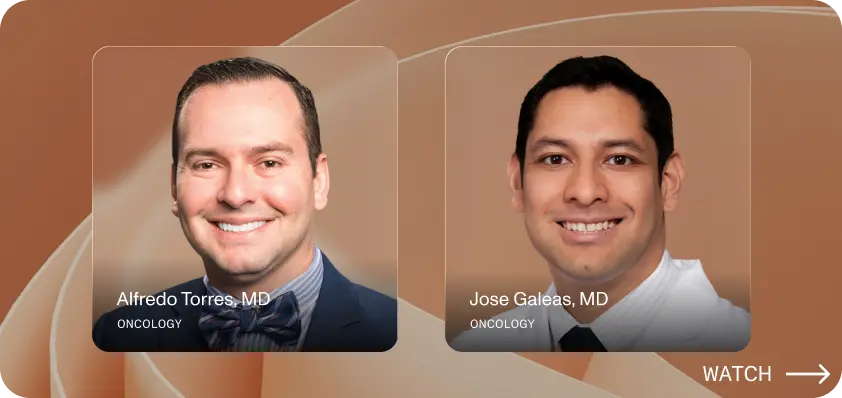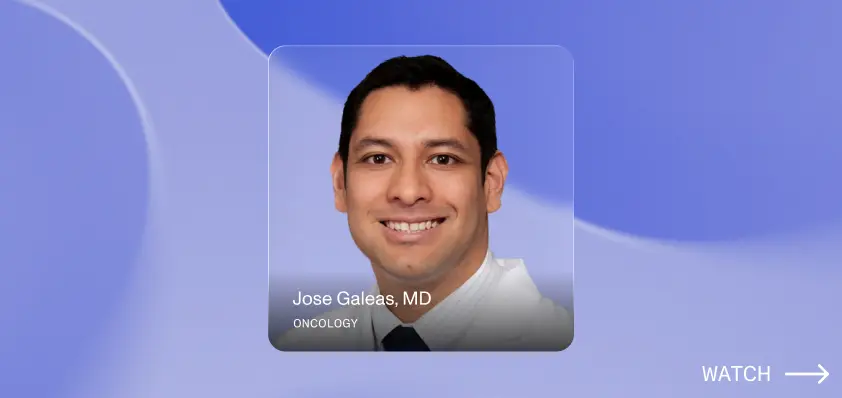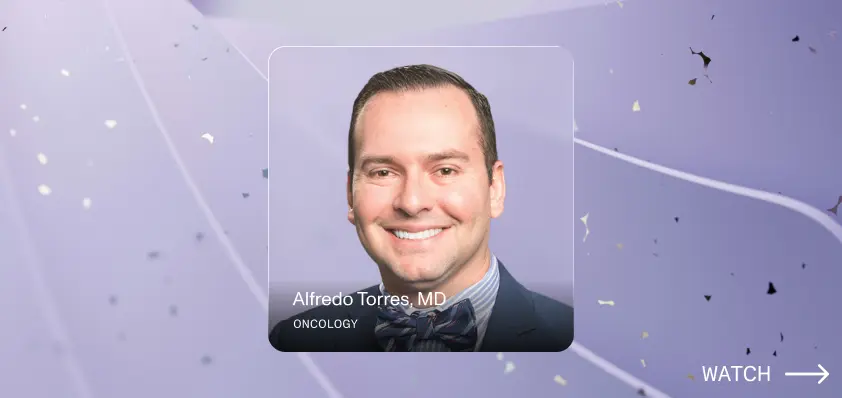Texas Oncology uses DeepScribe AI to stop clinician burnout, connect with patients, and automate coding
There was one critical consideration for Texas Oncology when selecting the right ambient AI: it must understand the complexity of oncological care.


Introduction: Oncologists look for "a better way"
Delivering cancer care can be incredibly demanding, both clinically and emotionally. The last thing an oncologist needs is the hefty burden of clinical documentation – especially when charting during an encounter sacrifices a true focus on the patient.
Dr. Gury Doshi was feeling that burden. As an oncologist and medical director at Texas Oncology, she knew she wasn’t the only physician spending late nights documenting patient visits. More than 1,000 clinicians deliver expert cancer care at Texas Oncology, an independent organization with 280 locations.
“Documentation is one of the major causes of burnout, specifically with oncologists, as cancer care has become increasingly more complex. I thought ‘there’s got to be a better way.’”
Gury K. Doshi, M.D., Medical director, Board member, Texas Oncology
Dr. Doshi approached James Lindsey, Principal, IT Strategy and Innovation, at Texas Oncology, to consider ambient AI technology as a relief for her and her colleagues. In her initial research, she found DeepScribe to be an innovator in the space...
Challenge
Texas Oncology physicians were documenting encounters late into the night – not great for their personal wellbeing, and particularly challenging considering the complexity of an oncology patient’s chart.
The Texas Oncology team wanted to improve physicians’ daily lives by removing that administrative burden and see greater efficiency in the process. By selecting the right ambient AI, they could satisfy those needs, but there was one critical consideration: the ambient AI must understand the complexity of oncological care, including specific oncology use cases, diagnoses, and treatment pathways.
Solution: The DeepScribe Difference
After reviewing multiple leading ambient documentation solutions, the Texas Oncology team determined that only DeepScribe was positioned to meet their requirements and deliver on the promise of ambient AI. “With the U.S. Oncology Network, we contemplated other vendors in the space,” says Lindsey. “It became very clear to me that DeepScribe was our best choice, for a variety of reasons.”
First and foremost, DeepScribe ambient AI could understand and properly document the specifics and complexities involved with cancer care. As an example, the custom AI model for oncology includes – and automatically scribes – note sections for interval history, labs, imaging, and the care team. In addition, each clinician could easily personalize the documentation to reflect their own note style. “Physicians have a lot of personal and professional preferences on how they'd like their note to look and to read,” says Lindsey. “With DeepScribe, providers can customize the look and feel and format of their notes and the content of those notes. That’s an outlier with DeepScribe compared to others.”
“DeepScribe's unique Customization Studio and ability to seamlessly integrate into our workflows stood out.”
James Lindsey, Principal, IT Strategy and Innovation, Texas Oncology
Lindsey and team also found DeepScribe’s medical-only AI technology, HealAI, to be a standout. Unlike a general platform like GPT-4, HealAI is a proprietary LLM (large language model) that learns from the largest clinical dataset in the world, based on more than 4 million patient conversations. The platform and specialty-specific knowledge made all the difference.
“Our documentation is very complex,” Lindsey explains. “If the AI couldn’t be tailored specifically to oncology use cases, you can have hallucinations in the AI – or the AI just gets it completely wrong.”
As DeepScribe was rolled out to Texas Oncology clinicians, the team quickly benefitted from its ease of use and accurate, high-quality documentation.
Result
Getting the first group of Texas Oncology clinicians set up was easier than perhaps anyone at the organization expected – 10 to 15 minutes per provider, including customizations and personal preferences. From there, the excitement was contagious.
“After they’ve seen colleagues review their first or second note produced by the AI, they’re just blown away,” says Lindsey. "They want to opt in right then, on the spot."
91% of Texas Oncology clinicians find DeepScribe easy to use.
88% say DeepScribe improves note quality.
Beyond precise documentation, Texas Oncology is experiencing benefits they may not have envisioned from an ambient AI partner: billing assistance.
“We’re seeing additional HCC capture as a result of DeepScribe coding the note,” says Lindsey. “And the number of ICD codes it yields for each patient is enormous. I didn’t expect that at all – and they’re accurate.”
“We went with DeepScribe to decrease physician burden and improve communication and relationships in the clinic,” adds Dr. Doshi. “The billing piece has been a complete surprise and has really, really helped us.”
1.5 - 2 hours weekly savings per clinician
1.6 minutes average chart closure time
2.4 minutes average time from note to EHR
Conclusion
With DeepScribe ambient AI delivering positive impact upon its initial rollout, Texas Oncology is seeing happier clinicians, billing assistance that only comes from industry-leading accuracy, and – most important – more fulfilling patient interactions.
“Previous notes from nurses, infusion notes, molecular data, radiographic imaging... AI is helping us review all of this and serve it up to us,” explains Dr. Doshi. “You returned me to being able to sit with my patient as opposed to trying to click in my EMR. After many, many years, the pendulum is swinging back to regaining the importance of that human-to-human connection.”
“Working with DeepScribe aligns perfectly with our mission to advance cancer care for all Texans. This innovative technology not only allows our clinicians to reduce time spent on documentation by significant hours each day, but also strengthens our ability to deliver better care.”
R. Steven Paulson, M.D., President and CEO, Texas Oncology
text
Related Stories
Realize the full potential of Healthcare AI with DeepScribe
Explore how DeepScribe’s customizable ambient AI platform can help you save time, improve patient care, and maximize revenue.




